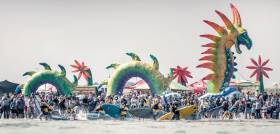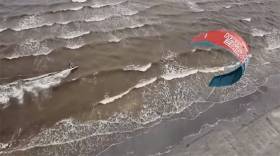Displaying items by tag: Battle for the Bay
Dollymount Ready For Battle For The Bay This Weekend
#Kitesurfing - Fun, wind, water and fun are promised at this weekend’s Battle for the Bay kitesurfing and SUP competition on Dollymount Strand.
The best riders in the country and from around the globe will converge on Bull Island on Saturday 26 and Sunday 27 May to compete in the first leg of the IKSA tour at what organisers say is one of the best kitesurfing spots in the world.
All ages are welcome to cheer on the competitors, whether taking flight by kite or standing tall on their paddle boards.
Instructors will also be on hand to show you the ropes, while the food village, funfair and biodiversity area means there’s much more than the action on the waters of Dublin Bay.
For more see BattleForTheBay.com.
#BattleForTheBay - All ages are welcome to Dollymount Beach on the north side of Dublin Bay today (Saturday 28 May) for the 10th edition of kitesurfing weekender the Battle of the Bay.
Doubling as the first leg of kiteboarding's KBC Tour, the weekend will also host contests for stand up paddle boarding - with the action even branching out to the River Liffey tomorrow morning (Sunday 29 May) for the Dublin Bay SUP Classic.
Plus as always throughout the weekend there will be food and entertainment on the beach, including kiting and SUP lessons for kids, as well as beach volleyball and land yachting demonstrations.
For more details visit the Battle for the Bay website HERE. And see below for some of the action from last year's event:
#Kitesurfing - The Sunday Independent profiles top kitesurfing prospect Katie McAnena ahead of next weekend's Battle for the Bay on Dollymount Strand.
Kitesurfers and stand-up paddle boarders from around the world will converge on Bull Island in Dublin Bay from 24-25 May for the annual championships, which are now in their eighth year.
And Galway native McAnena will be making her first appearance at the event, a year after becoming the first woman surfer to take on the infamous 'Jaws' wave in Hawaii.
But despite her world travels, the qualified doctor - who grew up windsurfing in Rusheen Bay - believes the Irish have "bigger, heavier waves here in Ireland right at our back door".
Independent.ie has more on the story HERE.































































